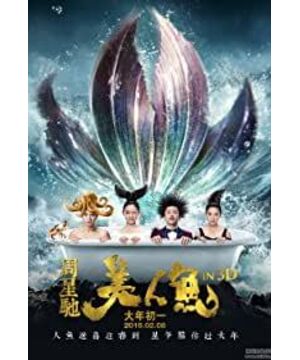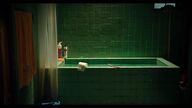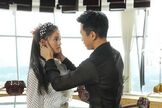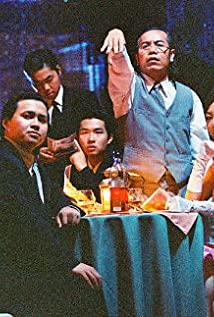Written by Yang Shiyang) The fat Song Dongye sings in that not-so-widely well-known "Wreath of Dreams Boy", half psychedelic and half half-hearted, "a drowsy urchin, dreams are like spirits." For Xing Ye's "Mermaid", this sentence has an indescribable aptitude. In this movie, Zhou Xingchi is like a child who has just met the world but has no words, and he pours out his grievances against the adult world. He cleverly used childlike expressions to utter those sentences about environmental protection and human greed, covering the original naive view of dreams with a unique legitimacy.
The evaluation of Stephen Chow's works is almost destined to be polarized, just like the exaggerated expression of the movie itself, everything about Stephen Chow has been exaggerated and magnified. As a passerby who has been unable to turn fans and has no reason to turn black, objectively speaking, this work is by no means amazing, but it is not disappointing. These 90 minutes are full of cute loopholes and almost stubborn. Haughty and childish. Let's put it this way, Zhou Xingchi presumptuously told the adult fairy tales in "Mermaid", taking childishness as a kind of character. In the filthy world he described, the pretentious and almost overkill innocence is like a resistance movement.
This commercial movie released on the first day of the Lunar New Year just seems to have a lively and funny shell, but in fact its core is a fairy tale that may seem ridiculous in the eyes of adults. As an adult, Zhou Xingchi stubbornly shouted to all adults. The response he hopes to hear is, "You smile and tell me that the fairy tale is really not a lie."
The setting of "The Mermaid" has a standard fairy tale archetype structure. The human world is evil and greedy, and the mermaid world is beautiful and innocent. This first satisfies the standard black-and-white opposition; the mermaid Shanshan is a pure character with innocence. Desire for revenge and a pure view of love, Deng Chao plays a hard-looking but soft-hearted character, representing the kind of figure who will eventually be destined to be influenced by his conscience; while Zhang Yuqi is almost equivalent to the evil queen. This triangular relationship evolved from the initial alliance between Deng Chao and Zhang Yuqi into an alliance between Deng Chao and Shanshan. The former's covenant is based on money and ambition, which belongs to the form of aggression-therefore, what they do is to reclaim the sea and create land; while the latter's covenant is based on love, which belongs to the form of guardianship, so they finally choose to The property was donated to the environmental protection agency, and the two of them almost lived in seclusion. Deng Chao's identity and inner change have completed a baptism, and the relationship between him and Shanshan is almost equivalent to saving each other. Let good conquer evil. This is a standard fairy tale, almost without even transforming it.
In terms of the subject matter itself, this film is extremely naive, whether it is the documentary fragments that destroy the environment and ecology in the opening, or the theme of human greed that was later extended. But Zhou Xingchi is very smart. He understands that if he evasively or completely solemnly presents this, he is destined to encounter ridicule. Therefore, he simply chose to show a fairy tale with great fanfare. As long as the fairy tale itself is self-consistent, it can form a metaphor that is independent or even higher than the real world. People will not judge fairy tales based on the standards of the duny world, but will accept the truths explained in fairy tales, even that truth. So straightforward, simple and impractical.
Therefore, when the elders of the mermaid tribe expound the history of the tribe, the separation from humans, mutual help, and friendship, saying that humans are evil, we will not feel naive; when we see Shanshan suddenly fall from hatred to love, In a moment of defiance, we would not make a mocking sound when seeing the overbearing president and an innocent Cinderella kiss, because we felt that fairy tales need to be treated with a different perspective. If you don't use the perspective of a fairy tale to describe these, then Shanshan can only be portrayed as a scheming bitch, rather than a pure and cute girl like this. The choice of this narrative method is Zhou Xingchi's chicken thief.
The interspersed "Invincible" is actually very interesting. They sang, "How lonely is invincible, and how empty is invincible". Human beings have been moving towards the "invincible species", which is the inertial ambition of biological evolution, but Zhou Xingchi has seen the nihility after the true invincibility from the philosophical dimension. "If you have more money, but there is not a drop of clean water on the earth, what is the use of money." This is naive and almost arrogant, but it has been told with great fanfare, and it has become the core of the fairy tale. The opposite of "invincible", people are invincible when they are the most humble, but wherever there is a bottom line, there are weaknesses and flaws. Therefore, Deng Chao said to Zhang Yuqi in that laboratory, "There must be a bottom line, right?" What have we become today? Only in fairy tales can you dare to accept this most basic morality. This is already a bit chill.
From a technical perspective, the special effects of "Mermaid" are terrible, and the dubbing is even worse, but Stephen Chow has made all this deliberate. This crude aesthetic system is just like deliberately made in the current 3D era. An 8-bit game console game, it has the temperament of a video room and a VCD, a kind of memory and echoes the special situation of Stephen Chow's early works.
At the beginning, the greedy and wretched uncle of the Shanzhai Museum had been using a fake mermaid to deceive people. In the end, he was able to witness a real mermaid. Taking that photo became an experience for him to get out of his body, and this scene became an interesting end-to-end echo. What he mocked and used to deceive was finally proved to be real, which was like an enlightenment to him. This is another fairy tale in itself.
From the perspective of watching these fairy tales, this movie is really peculiar. In a secular atmosphere that absolutely advocates pragmatism, a group of audiences try their best to put on snobbish expressions to avoid being regarded as naive to the greatest extent possible. I was immersed in the most idealistic fairy tale in 90 minutes. To some extent, this is a little conspiracy of Stephen Chow's style.
View more about The Mermaid reviews











